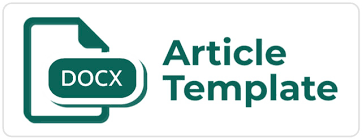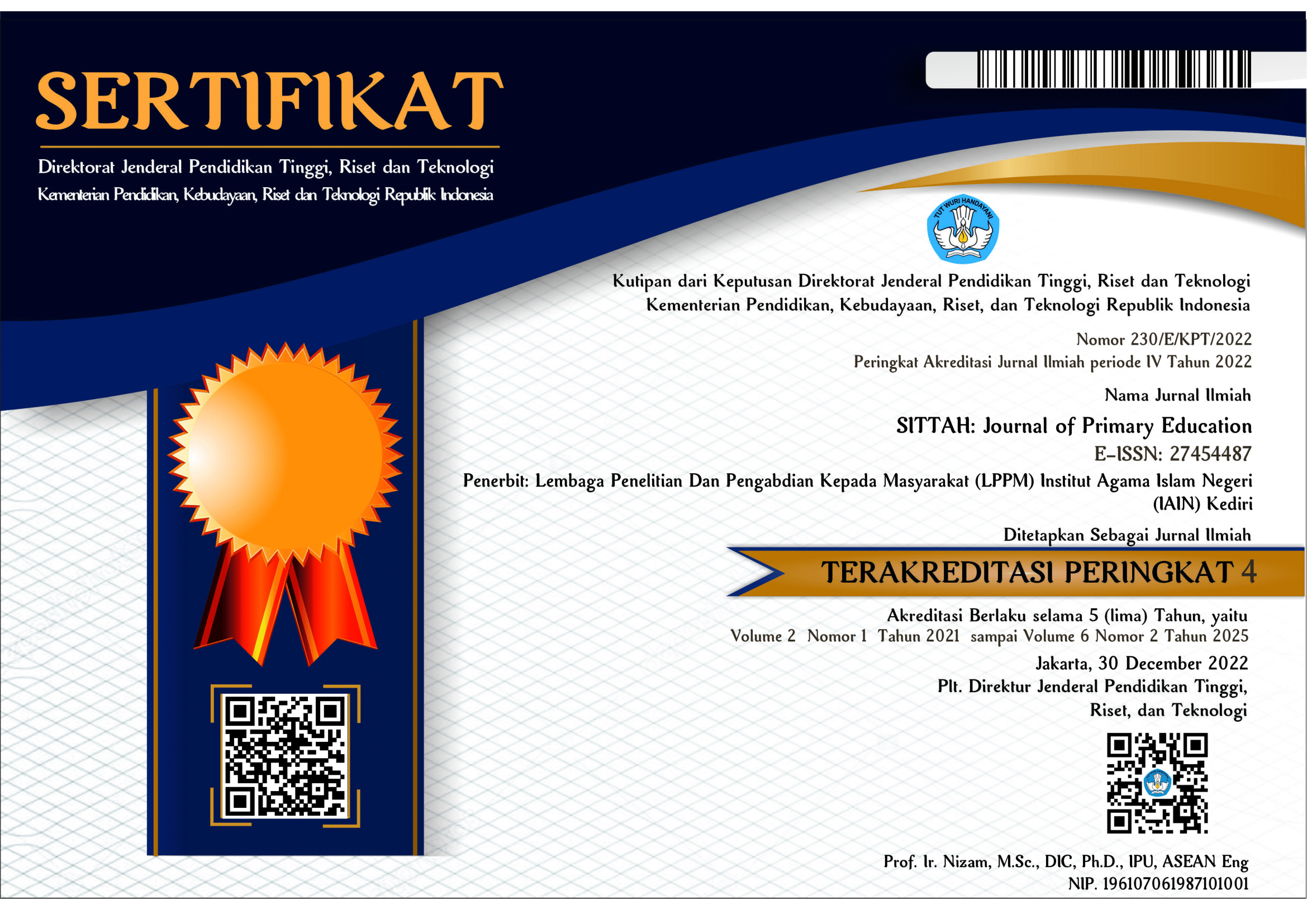PENGEMBANGAN KOMPETENSI DIGITAL GURU PENDIDIKAN AGAMA ISLAM SEKOLAH DASAR DALAM KERANGKA KURIKULUM MERDEKA
DOI:
https://doi.org/10.30762/sittah/v3i1.11Keywords:
Belajar.id Account, Freedom Teaching, Teacher’s Digital CompetencyAbstract
The use of various new technologies in the learning process has strengthened since the COVID-19 pandemic. The practice has two general implications, positive and negative. This paper seeks to reveal the efforts of Islamic religious education teachers at the elementary school level in increasing their digital competence amid the strengthening of new technology in learning. This study used descriptive qualitative research methods. This study indicates that the development of digital teacher competencies takes place through two stages—First, the stage of strengthening digital competence by following technical guidance on the management and use of ICT for elementary school (SD, Sekolah Dasar) teachers, developing it by self-study through the use of YouTube, making products in the form of Google Sites, and using it in the learning process in the classroom. Second, implementing a post-guidance training program for teachers and students at the school where they work. The study’s implications are discussed within the framework of an independent curriculum. The practical suggestion of this study lies in the importance of integrating technical guidance, teacher’s independent learning, and collaboration between teachers as the basis for developing teacher competence.
Downloads
References
Abshor, M. U. (2021). Pendidik Transformatif: Antara Disrupsi dan Pandemi Covid-19. Intelektual: Jurnal Pendidikan Dan Studi Keislaman, 11(2), 173–186. https://doi.org/10.33367/ji.v11i2.1846
Agustini, D., Lian, B., & Sari, A. P. (2020). School’s Strategy for Teacher’s Professionalism through Digital Literacy in the Industrial Revolution 4.0. International Journal of Educational Review, 2(2), 160–173. https://doi.org/10.33369/ijer.v2i2.10967
Amrizal, A. (2021). Peningkatkan Kompetensi Literasi Digital Guru Melalui Pelaksanaan Workshop Tingkat Sekolah Pada SDN 12 Kampung Batu Dalam Kabupaten Solok. Jurnal Pendidikan Tambusai, 5(2), 5417–5425.
Anggraena, Y., Felicia, N., Eprijum, D., Pratiwi, I., Utama, B., Alhapip, L., & Widiaswati, D. (2022). Kajian akademik kurikulum untuk pemulihan pembelajaran [Monograph]. Pusat Kurikulum dan Pembelajaran. http://repositori.kemdikbud.go.id/24972/
Aniqoh, S., Ma`arif, M. A., & Kartiko, A. (2021). Kreativitas Guru Al Qur’an Hadist dalam Mendesain Model Pembelajaran Berbasis Literasi Digital dalam Masa Pandemi. Center Of Education Journal (CEJou), 2(02), 30–42. https://doi.org/10.55757/cejou.v2i02.21
Basalamah, M. S. A., As’ad, A., & Kamidin, M. (2021). The Influence of Leadership and Training on Teacher Competence and Performance. Ta’dib: Jurnal Pendidikan Islam, 26(2), 125–139. https://doi.org/10.19109/td.v26i2.11839
Colás-Bravo, P., Magnoler, P., & Conde-Jiménez, J. (2018). Identification of Levels of Sustainable Consciousness of Teachers in Training through an E-Portfolio. Sustainability, 10(10), 3700. https://doi.org/10.3390/su10103700
Falloon, G. (2020). From digital literacy to digital competence: The teacher digital competency (TDC) framework. Educational Technology Research and Development, 68(5), 2449–2472. https://doi.org/10.1007/s11423-020-09767-4
Habibah, M. (2019). Pengembangan Budaya Literasi Agama di SMA Negeri 2 Kediri. Indonesian Journal of Islamic Education Studies (IJIES), 2(2), 203–215. https://doi.org/10.33367/ijies.v2i2.1110
Habibah, M., & Wahyuni, S. (2020). Literasi Agama Islam sebagai Strategi Pembinaan Karakter Religius Siswa RA KM Al-Hikmah Kediri. Journal of Childhood Education, 3(2), 40–53.
Husna, H. T. (2022, March 25). Indeks Literasi Digital Indonesia 3.49, Ini yang Bisa Dilakukan Pemerintah. Ditjen Aptika. https://aptika.kominfo.go.id/2022/03/indeks-literasi-digital-indonesia-3-49-ini-yang-bisa-dilakukan-pemerintah/
Kemendikbud, S. G. L. S. (2019). Desain Induk Gerakan Literasi Sekolah (2nd ed.). Direktorat Jenderal Pendidikan Dasar dan Menengah Kementerian Pendidikan dan Kebudayaan.
Kholid, K. (2020). Pentingnya Literasi Digital bagi Guru pada Lembaga Pendidikan Tingkat Dasar dan Implikasinya terhadap Penyelenggaraan Kegiatan Belajar Mengajar. Jurnal Horizon Pedagogia, 1(1), 22–27.
Kuncahyono, K., & Kumalasani, M. P. (2020). Implementasi Literasi Digital Guru SD Melalui Pendampingan Pembuatan Digital Material (Sway). International Journal of Public Devotion, 3(1), 21–30. https://doi.org/10.26737/ijpd.v3i1.2044
Liu, Z.-J., Tretyakova, N., Fedorov, V., & Kharakhordina, M. (2020). Digital Literacy and Digital Didactics as the Basis for New Learning Models Development. International Journal of Emerging Technologies in Learning (IJET), 15(14), 4–18.
Maulan, R., Oktavianingsih, E., Khoiroh, R. K., Irawan, H. A., Febrianto, I., & Ardianto, H. (2021). Buku saku merdeka belajar: Episode 1-10 Kemendikbudristek (D. K. Pertiwi & R. Maulana, Eds.). Kementerian Pendidikan, Kebudayaan, Riset, dan Teknologi. http://repositori.kemdikbud.go.id/23566/
Miles, M. B., Huberman, A. M., & Saldaña, J. (2014). Qualitative data analysis: A methods sourcebook (Third edition). SAGE Publications, Inc.
Muftiroh, I., & Atqia, W. (2022). Implementasi Gerakan Literasi Digital Keagamaan Di Era Pandemi Covid-19 SMAN 1 Petarukan. Edification Journal : Pendidikan Agama Islam, 4(2), 263–274. https://doi.org/10.37092/ej.v4i2.307
Nugraha, D., Mansyur, A. S., & Zaqiah, Q. Y. (2020). Peningkatan Hasil Belajar PAI tentang Taharah melalui Pembelajaran Berbasis Literasi Digital. Paedagogie, 15(1), 29–32. https://doi.org/10.31603/paedagogie.v15i1.3600
Nurhidin, E., & Habibah, M. (2021). Desain Pengembangan Kurikulum Pendidikan Islam Transdisiplin. JALIE; Journal of Applied Linguistics and Islamic Education, 5(1), 170–191. https://doi.org/10.33754/jalie.v5i1.339
Nurpratiwi, S., Effendi, M. R., & Amaliyah, A. (2021). Improving Religious Literacy Through Islamic Religious Education Course Based On The Flipped Classroom. Istawa : Jurnal Pendidikan Islam, 6(1), 16–29. https://doi.org/10.24269/ijpi.v6i1.3107
Penyusun, T. (2017a). Kerangka Literasi Digital (D. BU, Ed.). ICT Watch - Indonesia (www.ictwatch.id). http://literasidigital.id/books/kerangka-literasi-digital-indonesia/
Penyusun, T. (2017b). Materi Pendukung Literasi Digital (L. A. Mayani, Ed.). Kemdikbud. https://gln.kemdikbud.go.id/glnsite/buku-literasi-digital/
Qomar, M. (2019). Pendidikan Islam transformatif. Madani Media.
Sánchez-Cruzado, C., Santiago Campión, R., & Sánchez-Compaña, M. T. (2021). Teacher Digital Literacy: The Indisputable Challenge after COVID-19. Sustainability, 13(4), 1858. https://doi.org/10.3390/su13041858
Schussler, D. L. (2020). ‘Mindful teaching’: A construct for developing awareness and compassion. Reflective Practice, 21(5), 646–658. https://doi.org/10.1080/14623943.2020.1798918
Smith, W. A. (2008). Conscientizacao: Tujuan Pendidikan Paulo Freire (Prihantoro, Trans.; 2nd ed.). Pustaka Pelajar.
Sopian, A., Najili, H., Erihadiana, M., & Ruswandi, U. (2022). Kesiapan Guru Agama Islam Dalam Menghadapi Isu-Isu Global. JURNAL EDUSCIENCE (JES), 9(1), 40–53. https://doi.org/10.36987/jes.v9i1.2549
Sulastri, D., Maula, L. H., & Uswatun, D. A. (2020). Pemanfaatan Platform Digital Dalam Pembelajaran Online Selama Masa Pandemi Covid-19 Di Sekolah Dasar. Jurnal Pendidikan Dasar, 11(02), 219–229. https://doi.org/10.21009/10.21009/JPD.081
Untung, M. S., Mustakim, Z., Afroni, A., Kholid, M., & Rokhmah, A. (2022). Local Wisdom-Based Learning Innovation on Madrasah Ibtidaiyah in Digital Era. Edukasia Islamika, 7(1), 92–114. https://doi.org/10.28918/jei.v7i1.5437
Wahyudi, D., & Suwandana, E. (2022). Efektivitas Implementasi Kebijakan Akun Belajar.Id Kemendikbud Oleh Tenaga Kependidikan. Jurnal Kebijakan Pembangunan Daerah, 6(1), 16–26. https://doi.org/10.37950/jkpd.v6i1.140
Wajdi, M., Akib, T., Natsir, M., Hasan, E., & Abidin, A. (2021). Hubungan Antara Kecakapan Literasi Digital Dengan Kreativitas Mengajar Guru Dalam Kegiatan Pembelajaran. Jurnal Riset dan Inovasi Pembelajaran, 1(3), 214–222. https://doi.org/10.51574/jrip.v1i3.259
Downloads
Published
How to Cite
Issue
Section
License
Copyright (c) 2022 Maimunatun Habibah

This work is licensed under a Creative Commons Attribution-NonCommercial-ShareAlike 4.0 International License.











